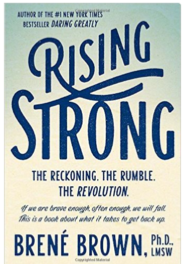
What’s Your Story? (About Your Daughter)

At the end of August, I was blessed to hear her speak on her new book Rising Strong, in her hometown Houston. And I would highly recommend that you pick up your own copy of Rising Strong if you have not already.
There are many things I love about this book, but today I am going to focus on one aspect of her book—the stories we tell ourselves.
Human beings are all about story. And that’s what I do for a living as a marriage and family therapist, I listen to people’s stories. Ideally, I do this with discernment, empathy, understanding, and without judgment.
One of the challenges as a marriage and family therapist is everyone’s stories have a different slant. No big surprise that moms and daughters don’t see things eye to eye.
This also applies to your spouse, your parents, your friends and everyone else.

Why is that?
Here’s an example.
Situation: Riley failed her chemistry final.
When we are calm and reflective we are going to create stories that are much more accurate, helpful, and hopeful.
“My daughter Riley is really a great girl. Overall she does well in school, her teachers love her and she has a good group of friends.”
However, the stories we tell ourselves when we are triggered with strong emotion like fear, panic, worry, anger, sadness, stress or frustration can escalate the drama, and do damage to the relationship.
“Riley is not going to make it. She’s going to blow her future. She is so obstinate and lazy. She is so selfish and doesn’t care about my feelings.”
It’s so important to be aware of the story you are telling yourself about your daughter.
Here’s why.
Your story determines how you will treat your daughter. The calm mom and her story would treat Riley very differently than the triggered mom and her story.
See triggered mom is full of strong emotions like hurt, fear and anger. If you don’t reckon with theses emotions Brene’ states in Rising Strong then you will off-load hurt and emotional pain. “Hurt doesn’t go away simply because we don’t acknowledge it. In fact, left unchecked, it festers, grows, and leads to behaviors that are completely out of line with whom we want to be, and thinking that can sabotage our relationships and careers.”
(And yes your daughter does the same thing to you.)
But this article is for you. First, it’s important for you to take 100% responsibility for your stories, feelings, and actions. You are modeling something powerful for your daughter.
I’ve talked to many a triggered mom in my therapy office. I get it; I’ve been there. They are trying to work through these intense feeling and the stories behind them. And we need a safe place to do that.
They are in my office because the stories about their daughters are torturing them and draining all the hope and joy out of their life.
The best news that I can tell them is that they are missing HUGE pieces of information that would bring them so much peace.
See our triggered brain is often not our friend.
It takes a little information and dramaticizes it. Brene’ calls these conspiracies and confabulations. “What do we call a story that’s based on limited real data and imagined data and blended into a coherent emotionally satisfying version of reality? A conspiracy theory.” Brene’ goes on to say that confabulations are when you “replace missing information with something false that you believe to be true.”
Here’s an example from my life.
When my daughter was a freshman in High School I let her go home with a new friend after school. She had been to her house once before, but I didn’t remember exactly where she lived. I was hesitant, because I wanted to pick her up and take her over there myself. About five pm I texted her and called her but she didn’t respond for an hour and a half.
(I’m telling on myself here.)
I panicked. I made up all sorts of stories that were not aligned with who I knew my daughter to be. I told myself that she had gone with a group of boys…doing drugs…etc…(As a therapist I had plenty of stories to choose from.)
Now I didn’t want to be right about my story, but this is what my triggered brain believed in that moment. Though my story felt true these were my conspiracies and confabulations.
Because I got so worked up, when my daughter finally called me, I did ‘lose it’ with her. I offloaded my panic and anger by yelling at her.
And she said, “What’s your deal mom?” (That didn’t stop my tirade.)
So what was the real story?
Here is the true story. Her friend’s mom picked my daughter up from school and they went to her home, and they all made chocolate chip cookies together.
And yes I was embarrassed. All that suffering for nothing.
Here’s the good news. Your triggered story is either completely wrong or missing essential information. It’s hard to recall all the wonderful facets about your daughter when you are triggered.
I totally agree with Brene here. It’s important to reckon with your intense feelings about your daughter, and not just off-load on her or anyone else (spouse). This is where it is helpful to talk through your feelings with a friend, mentor, coach, or therapist.
The story you’re telling yourself about your daughter matters immensely. The truth is that your daughter is hardwired for drama and is a work in progress. But she is also a beautiful, talented, gifted, amazing human being that is stumbling forward into adulthood.
Maybe it’s time to write a new story about your daughter.

